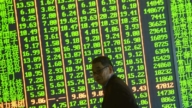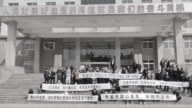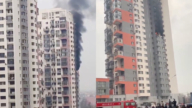【新唐人2013年08月17日訊】中共中央最近刮起了審查地方債務風暴,大陸各地方政府可謂風聲鶴唳,有地方財政局長自爆,因為尋求對策而愁白了頭。中央高級官員和各路專家也在為處理後事而出謀劃策,他們普遍趨向於「變賣資產」來解決地方債務。那麼,變賣地方資產真的能解決地方債務帶來的危機嗎?我們來看看專家分析。
中共財政部原部長項懷誠在4月份的博鰲亞洲論壇上透露,從公開披露的數據看,截至2011年底中央和地方政府債務達到30多萬億元。項懷誠表示,因地方政府債務透明度不高,實際數據可能比統計數據高一些。
有中共媒體撰文表示,一旦地方債風險爆發,地鐵站可能會停工,不僅地方政府要遭殃,風險還會沿著財政鏈條傳導到中央政府,通過金融鏈條傳導到金融體系,威脅整個國家的經濟安全。
近日新一屆政府審計地方政府債務的風暴,引起了廣泛擔憂,東部某發達省份的一位縣級市財政局長聲稱,自己頭髮都愁白了。這位財政局長透露,自己三天兩頭被書記、市長「拎著」,跑各家銀行的省行、總行去匯報,商量對策。
中共國家發改委宏觀經濟研究院常務副院長王一鳴提出了一個解決辦法,就是實在還不起債的地方,可以適當的「變賣家產」、度過危機。
香港慢牛投資公司董事長張化橋也撰文分析,中國的財政赤字快速增長,銀行力不從心,出售土地也無法維持。而政府急於為進一步的經濟增長提供資金,當局為避免長期停滯,中國很快會展開第二波私有化。他認為,中國地方政府變賣資產高潮即將來臨。
清華大學經管系教授李志文:「真的是有解決方案嗎,其實是很難的,這後面真的是步步維艱,不放是死定了,這種吸血鬼的制度哪能活得下來,放了,這吸血鬼都出來,最後在這個亂的過程中還是賣給吸血鬼。」
美國南卡羅萊納大學艾肯商學院教授謝田:「那變了資產賣給誰呢,我們也知道這些錢很多都進入到了貪官的手裡,他們變賣的時候很可能把地方政府的資產,賣給了那些中共的貪官本身,實際上這個變賣資產還債的過程可能又變成一個貪官賺錢的過程。」
美國南卡羅萊納大學艾肯商學院教授謝田指出,如果採用變賣地方資產的方式來償還地方債務,一定會導致中國房地產泡沫破滅,引起資產縮水,同樣還不起債務。
謝田:「另外如果連帶房地產泡沫破滅,中共的國有銀行也會面臨巨大的麻煩,第二如果地方政府拍賣了資產還是還不掉,中國會不會出現倒閉,我想中央政府還不敢看到任其地方政府倒閉,因為中國實際上沒有一個獨立的地方政府,都是上級指派下級。」
謝田說,中央政府只有印發更多的鈔票來維持地方政府,但會引發通貨膨脹,同樣會導致中國民眾起來反抗。
李志文:「共產黨要垮臺是我50年(前)就預測的,制度要變是全世界都知道的事情,都等這一刻發生,如果我們能在政治上改革,是平穩成功的話,這個財產起碼要賣出去,變成稅收造福全國人民,這是全國人民的血汗,結果被貪官污吏吃掉了。」
大陸80年代末開始的國有資產重組,已經導致大量工人下崗,國有資產廉價流入權貴高層,造成當今中國貧富兩極的極大分化。
曾擔任世界銀行高級顧問的清華大學經濟管理系教授李志文,希望通過《新唐人》向良知尚存的大陸民眾呼籲,不要把個人的得失放在第一位,在國難當頭要敢於揭露真相,防止吸血成性的貪官們,又在地方債務上大動手腳使國家財產再次遭受損失。
採訪編輯/劉惠 後製/李智遠
Is Selling Local Government Assets to Pay Off Debts a Solution?
Recently, China has launched a sweeping inspection
of local debt levels and borrowing habits, making
local governments extremely scared and jittery.
Some local finance directors revealed that they
are desperately seeking a solution to get it around.
Central high-ranking officials and different
experts are discussing to find a solution.
Their general answer is to sell
all assets to pay-off any debts.
Can this idea resolve the existing crisis
that has been caused by these debts?
Let’s take a look at what our experts say.
Xiang Huaicheng, is the former financial minister.
In the Boao Forum for Asia in April, he said that
according to official data, by the end of 2011,
the Central and local government had 30 trillion
Yuan ($5 trillion) of debt.
Xiang said that the local government’s debt isn’t
transparent enough, and real figures could be higher.
Some media reported that once the crisis of local government
debt breaks out, it won’t only be local governments who suffer.
It will also affect the central government, via a financial chain.
and affect the financial system, threatening China’s economy.
The sweeping inspection of local debt caused wide concerns.
A county-level finance director claimed that
his hair turned to grey because of the pressure.
This director revealed that he frequently visited the banks
with the party secretary and mayor to discuss the solution.
Wang Yiming, deputy director of National
Macroeconomic Research Institute suggests
local government can sell assets to pay debts.
Zhang Huaqiao, CEO of a Hong Kong
investment company, analyzed the situation.
China’s fiscal deficit is growing fast, the banks are
powerless, and land selling can’t help them survive.
Yet the governments are eager to provide
funds for pushing for economic growth.
In order to avoid long-term stagnation, a second
wave of privatization will soon be launched.
Zhang said that the time of local
governments selling assets is coming.
Li Zhiwen, Prof. in Tsinghua University: “Will
there be a solution? Actually, it is very difficult.
Every step will be hard; if it is not selling assets, they
will be finished. Within this regime, can they survive?
In selling assets, all corrupt officials will come out. During
the chaotic process, all assets will be sold to them.”
Xie Tian, Professor at the Aiken Business School,
University of South Carolina: “Who will buy these assets?
We all know, Many cash runs into
the pockets of corrupt officials.
This way the local government’s assets
are likely to be sold to corrupt officials.
Thus the process of selling assets will become
the process of corrupt officials making money.”
Xie Tian said that selling assets to pay off debts
will lead to the real estate bubble bursting.
This will cause assets to shrink, and yet, local
governments still can’t afford to pay off debts.
Xie Tian: “After the bubble is burst,
the state banks will face great troubles.
Selling assets still can’t pay off these debts,
so will the government become bankrupt?
I think the central government dares not
see the local government’s bankruptcy.
In China, local government is not independent,
and higher levels manipulate the lower levels.”
Xie Tian said that the central government has to issue
more bank notes to keep the local government afloat.
However, this will cause inflation,
and lead to Chinese people uprising.
Li Zhiwen: “50 years ago, I predicted the CCP’s collapse.
The worlds people know that this system can’t
last, and people are waiting for this moment.
If we implement political reform, smoothly
and successfully, assets can be sold out.
It can become state revenue to benefit the whole nation.
This is the whole nations’ hard-earn money,
but we are bribed by those corrupt officials.”
China began to restructure it’s state assets in
the late 80s, causing many workers to be laid-off.
State assets were cheaply grasped by privileged groups,
creating a greater gap between the extreme rich and poor.
Li Zhiwen, former senior consultant of the World Bank
and Professor in the Economic Department of Tsinghua
University, addressed Mainland China via NTD.
He urges people not to place
personal interests as their top priority.
Facing a national crisis, one should dare to reveal the truth.
This can help prevent corrupt officials from their tactics
with local debt, and avoid these state assets from being damaged again.

























